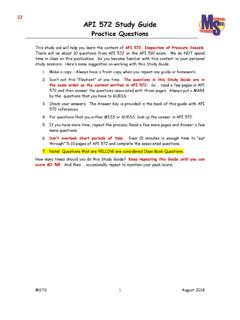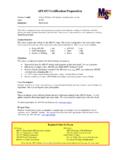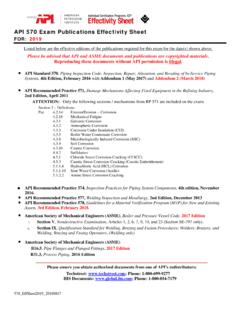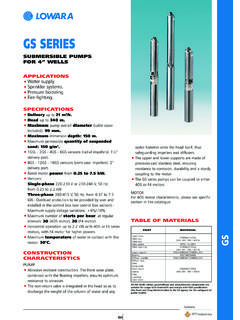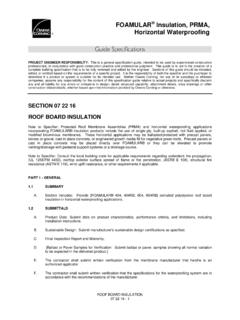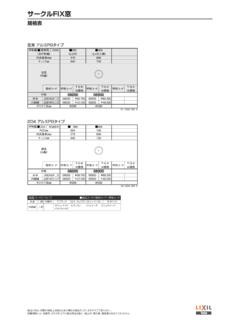Transcription of API 570 Certification Prep - MSTS Training
1 API 570 Certification prep API 578 Practice Questions MSTS 1 February 2013 This following study aid helps you learn the content of API RP-578, Material Verification Program for New and Existing Alloy Piping Systems. There will be about 5 questions from this document on the API 570 exam. We do not spend class time on this publication. So it is important that you become familiar with this content in your personal study sessions. The questions in this study aid are in the same order as API 578. The answer key with references is in the back of this guide. It is helpful to read through API 578 before working on this exercise! Questions in Yellow are Open Book Questions! 1. API 578 provides guidelines for a material assurance system to verify: a.
2 All materials. b. all alloy materials. c. only non-ferrous materials. d. only high-alloy materials. 2. The material verification program specified by API 578 covers: a. only pressure-containing components. b. only pipe, and fittings. c. only pipe, fittings, and welds. d. pressure-containing and non-pressure containing components. 3. An alloy material is any metallic material that contains alloying elements that are added: a. only to improve mechanical properties. b. only to improve corrosion resistance. c. to improve either mechanical properties or corrosion resistance. 4. An inspection lot includes: a. all materials from a common source. b. all materials included on the same purchase order. c. all materials of the same material type ( 316 SS) d. all materials from a common source, of the same material type and same heat.
3 API 570 Certification prep API 578 Practice Questions MSTS 2 February 2013 5. For construction and repair activities a written material verification program should be established by the: a. API 570 Authorized Inspector. b. Engineering Organization. c. Owner/User. d. Repair Organization. 6. The material verification program should cover PMI testing of materials: a. during construction of piping systems. b. in existing piping systems. c. during repairs and alterations of piping systems. d. in existing piping systems and during construction, repairs and alterations of piping systems. 7. During repairs, random PMI sampling of new components is most appropriate for: a. low-risk piping systems. b. low alloy piping systems. c. stainless steel piping systems. d.
4 Ferritic steel piping systems. e. all piping systems. 8. Who has the responsibility to determine the extent of PMI performed? a. API 570 Authorized Inspector b. Owner/User c. Piping Engineer d. Repair Organization 9. During construction the Owner should consider 100% PMI of new components on: a. all piping systems. b. all alloys above P-5. c. exotic alloys. d. high-risk piping systems. API 570 Certification prep API 578 Practice Questions MSTS 3 February 2013 10. Usually substituting an alloy for carbon steel does not cause a problem. But hardenable alloys may cause failure in some carbon steel systems. Which of the following process services would substituting an alloy for carbon steel not result in a potential problem. a. Benzene b. Hydrofluoric acid (HF) c.
5 Sulfuric acid d. Wet hydrogen sulfide 11. Who is responsible to assure that the material verification program meets the guidelines of API 578? a. Authorized Inspector b. Examiner c. Owner/User d. Piping Engineer 12. Who is responsibility to verify the adequacy of the material verification program that is performed by material suppliers? a. API PMI Specialist b. Authorized Inspector c. Piping Engineer d. Owner/User 13. Who has the responsibility to review and approve the adequacy of the PMI program used by fabricators? a. API 570 Authorized Inspector b. API 578 Certified Inspector c. Engineering Organization d. Owner/User e. Repair Organization 14. A mill test report: a. eliminates the need for further material verification. b. is a report showing material discrepancies.
6 C. is an important part of the material qualify assurance program. d. is issued by the owner upon receipt of materials. API 570 Certification prep API 578 Practice Questions MSTS 4 February 2013 15. During construction, which of the following alloy components does not need to be covered by a material verification program? a. Bolts b. Expansion Joints c. Gaskets d. Pressure containing welds e. All the above components need to be checked 16. During alloy welding: a. one electrode from each pallet should be identified. b. two electrodes from each pallet should be identified. c. one electrode from each lot or package should be identified. d. two electrodes from each lot or package should be identified. 17. If alloy element(s) are contained in the flux of a welding electrode, PMI testing: a.
7 Is not necessary. b. is not necessary provided appropriate documentation is provided by the supplier. c. could be conducted on any of the production welds. d. could be conducted on a weld button prior to production welds. 18. New longitudinal welded alloyed pipe should: a. never be used. b. always receive random PMI testing of weld and base metal. c. receive random PMI testing of weld and base metal if there is a reason to suspect problems. d. always receive 100% PMI testing of weld and base metal. 19. PMI of autogenous welds is: a. always required. b. never required. c. not required if the weld rod was PMI tested. d. not required if the base metal was PMI tested. API 570 Certification prep API 578 Practice Questions MSTS 5 February 2013 20. Who has the responsibility to determine the extent of PMI testing required on existing piping systems?
8 A. API Authorized Inspector b. Engineering Organization c. Owner/User d. Repair Organization 21. When prioritizing the need for PMI on existing piping systems, which of the following is not a factor to consider? a. Age of the facility b. Consequence of failure c. Likelihood of failure d. Plant experience with inadvertent material substitutions e. Reason for the alloy 22. Incorrect substitution of carbon steel is most likely to be found in: a. chrome systems. b. stainless systems. c. any ferritic systems. d. any non-ferrous systems. 23. Which residual element in a carbon steel system has not caused increased corrosion rates in HF acid piping system? a. C b. Cr c. Cu d. Fe e. Ni 24. Low silicon carbon steel can corrode rapidly when exposed to: a. hydrogen-free sulfidation.
9 B. hydrogen-rich sulfidation. c. hydrogen-free oxidation. d. hydrogen-rich oxidation. API 570 Certification prep API 578 Practice Questions MSTS 6 February 2013 25. Carbon steel can corrode rapidly in hydrogen-free sulfidation when the silicon content in carbon steel is: a. < b. > c. < d. > 26. The owner decides to conduct PMI testing on some existing piping systems. Which of the following is a major factor in prioritizing the pipe? a. The effectiveness of the construction & maintenance practices b. The effectiveness of the inspection practices c. Age of the unit d. Line size 27. Which of the following piping components is most likely to have a substitution with the wrong material? a. A 20 length of 6 NPS pipe b. Weld-neck flange c. Expansion joint d.
10 Bolting 28. Which of the following piping components is most likely to have a substitution with the wrong material? a. A 10 length of 6 NPS 316L SS pipe b. 6 NPS Gate valve c. 4 NPS Monel elbow d. Slip-on flange 29. Who has the responsibility to determine the extent of PMI testing required during repairs and alterations of piping systems? a. API 578 Authorized Inspector b. Engineering Organization c. Owner/User d. Repair Organization API 570 Certification prep API 578 Practice Questions MSTS 7 February 2013 30. Who has the responsibility to evaluate the effectiveness of a PMI program during repairs and alterations? a. API Authorized Inspector b. Examiner c. Owner/User d. Piping Engineer e. Repair Organization 31. During repairs and alterations the Owner should: a.

